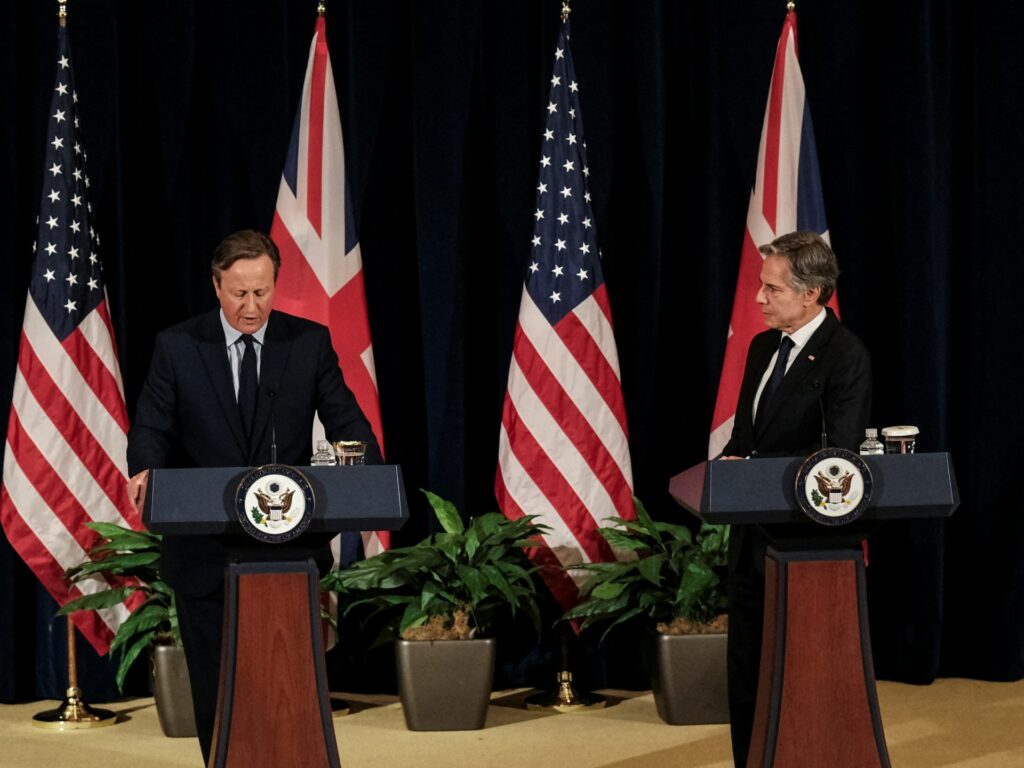The UK will not block arms sales to Israel, according to Foreign Minister David Cameron. The British government is facing pressure to stop weapons supplies to Israel as it continues its war on Gaza.
After reviewing the latest legal advice on the matter, Cameron stated that the UK will not halt arms sales to Israel by British companies. This decision comes six months into the Israeli assault on Gaza, which was sparked by a Hamas-led attack on Israel on October 7.
Despite calls from former senior UK judges and members of the legal profession to revoke arms export licences to Israel, the British government has decided to maintain its position. The government supplied £42 million ($53m) worth of arms to Israel in 2022.
Opposition parties in the UK are urging the government to recall Parliament from its holiday to address the issue of arms sales to Israel. Amnesty International UK’s crisis response manager criticized Cameron’s decision, calling it a missed opportunity to distance the UK from complicity in Israeli war crimes.
Israel denies committing war crimes or genocide in Gaza and rejects accusations of apartheid. The conflict has resulted in thousands of casualties, with Palestinian authorities reporting over 33,000 deaths and nearly 76,000 injuries in Israeli attacks on Gaza.
Cameron expressed concerns about humanitarian access in Gaza and defended the decision not to publish the legal advice on arms export licences. He emphasized the importance of acting consistently with legal advice, even if it is not made public.
During his visit to the US, Cameron discussed the situation in Gaza with US Secretary of State Antony Blinken. Israel has announced plans for a military offensive in Rafah, southern Gaza, where many displaced Palestinians have sought shelter.
Blinken stated that talks between Israeli and US officials are expected to take place regarding the potential military operation in Rafah. He emphasized the need to avoid major military operations in Rafah to prevent harm to civilians.
The US is working closely with Qatar and Egypt on a potential ceasefire agreement between Israel and Hamas in Gaza. Blinken highlighted efforts to increase humanitarian aid to Gaza and facilitate the entry of trucks into the region.
The information in this article was sourced from Al Jazeera and news agencies.
#block #arms #sales #Israel #Foreign #Minister #David #Cameron
Analysis of UK’s decision not to block arms sales to Israel
The decision by the United Kingdom to not halt arms sales to Israel despite growing pressure from various groups raises serious ethical concerns. The UK government’s stance on continuing arms exports to Israel, even in the midst of a deadly conflict in Gaza, has sparked outrage and calls for accountability.
With the UK being one of the major suppliers of arms to Israel, the decision to maintain export licenses sends a troubling message about the country’s priorities and values. By continuing to supply arms to a country involved in a conflict that has resulted in significant civilian casualties, the UK risks being complicit in potential war crimes and human rights violations.
The fact that the UK government has chosen not to disclose the legal advice behind its decision further undermines transparency and accountability. By keeping this information confidential, the government is shielding itself from scrutiny and preventing the public from understanding the rationale behind its actions.
Possible future developments and long-term implications
As the conflict in Gaza continues and international pressure mounts on Israel, the UK’s decision to maintain arms sales could have far-reaching consequences. It may damage the UK’s reputation on the global stage and strain its relationships with other countries that have taken a stronger stance against Israeli aggression.
Furthermore, the UK’s failure to take a stand against the violence in Gaza could embolden Israel to escalate its military operations, leading to further loss of life and exacerbating the humanitarian crisis in the region. This could have ripple effects across the Middle East and beyond, impacting regional stability and security.
Actionable advice
Given the gravity of the situation and the potential consequences of the UK’s decision, it is imperative for concerned citizens, advocacy groups, and international organizations to continue pushing for accountability and transparency. Here are some actionable steps that can be taken:
- Pressure the UK government to reconsider its stance on arms sales to Israel and demand greater transparency in its decision-making process.
- Support initiatives calling for a ceasefire in Gaza and the protection of civilians caught in the crossfire of the conflict.
- Raise awareness about the humanitarian crisis in Gaza and advocate for international intervention to address the root causes of the conflict.
- Engage with elected officials and policymakers to urge them to take a stronger stand against Israeli aggression and work towards a peaceful resolution to the conflict.
By taking collective action and holding governments accountable for their actions, we can help prevent further loss of life and contribute to a more just and peaceful world.

